Politics and Virtue: Contrasting Views in Machiavelli and Thomas More
VerifiedAdded on 2020/05/08
|7
|1855
|192
Essay
AI Summary
This essay examines the complex relationship between politics and virtue, contrasting the perspectives presented in Niccolò Machiavelli's "The Prince" and Thomas More's "Utopia." It explores Machiavelli's pragmatic view of political virtue, where a ruler must prioritize maintaining power, even if it means acting immorally, and compares it with More's idealistic vision of an Utopian society where virtuous citizens and leaders coexist. The essay analyzes the contrasting ideologies of the two authors, highlighting the differences in their approaches to governance, the qualities of an ideal leader, and the role of morality in politics. It also discusses the relevance of these contrasting views in the real world, considering the challenges of implementing utopian ideals and the potential consequences of Machiavellian pragmatism. Ultimately, the essay offers a nuanced understanding of the enduring debate about the relationship between politics and virtue.
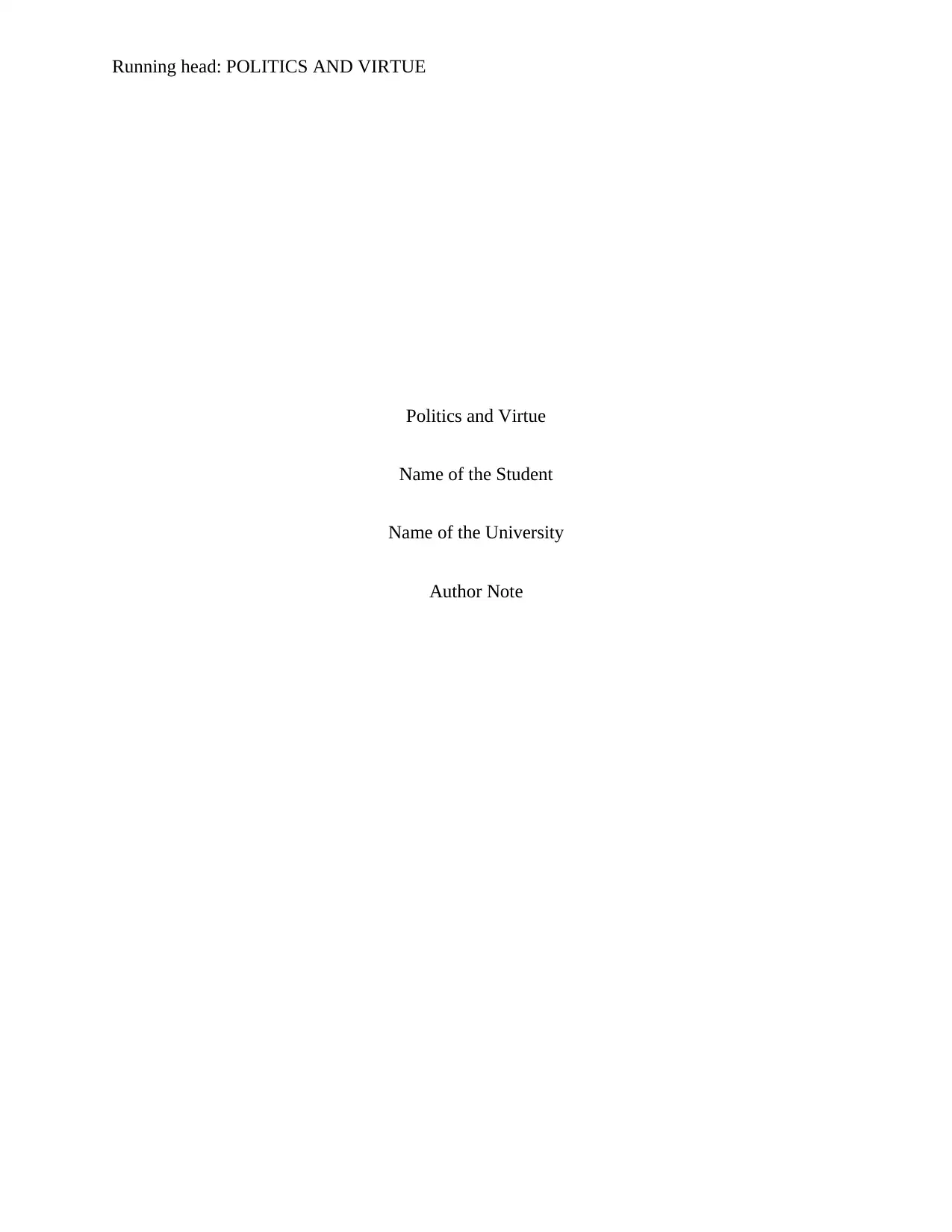
Running head: POLITICS AND VIRTUE
Politics and Virtue
Name of the Student
Name of the University
Author Note
Politics and Virtue
Name of the Student
Name of the University
Author Note
Paraphrase This Document
Need a fresh take? Get an instant paraphrase of this document with our AI Paraphraser
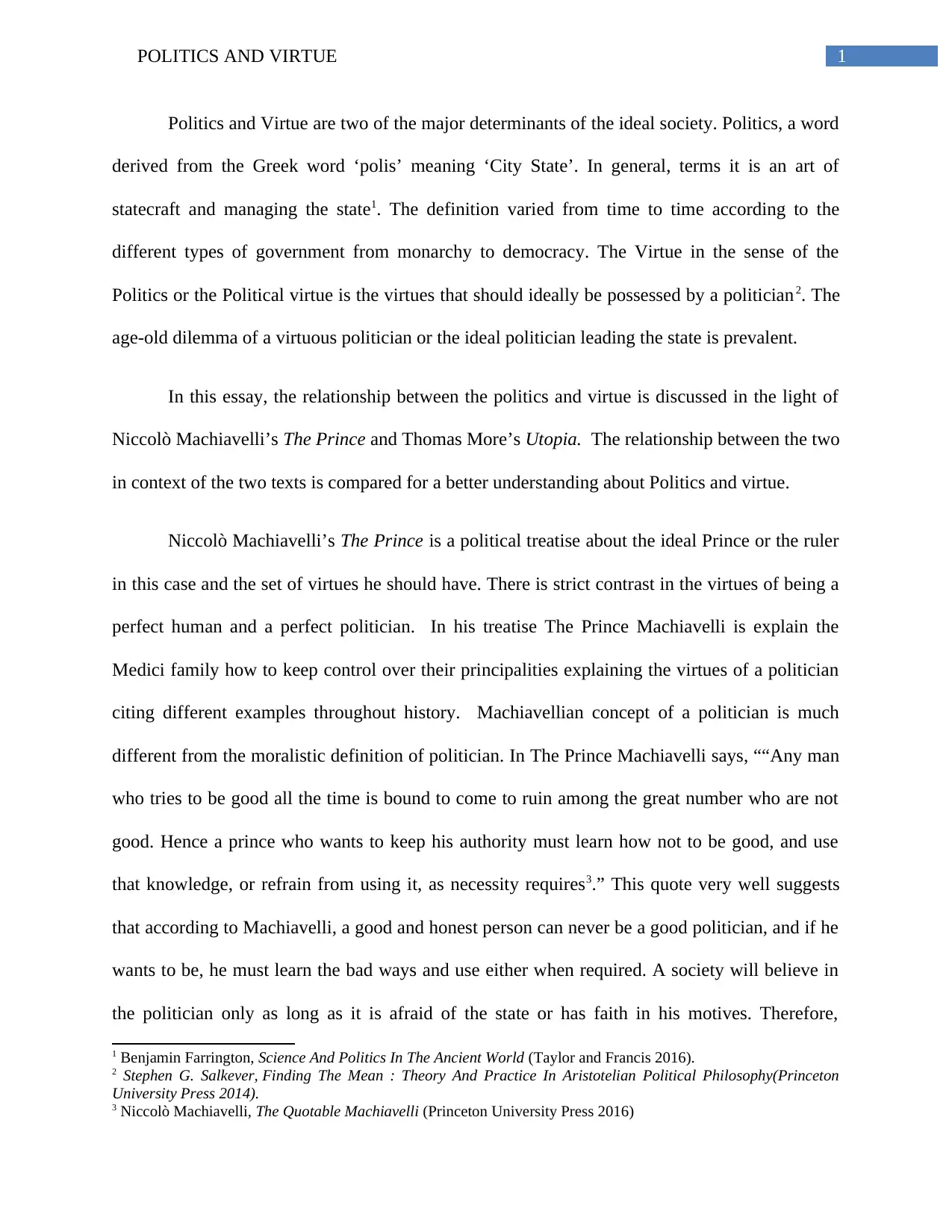
1POLITICS AND VIRTUE
Politics and Virtue are two of the major determinants of the ideal society. Politics, a word
derived from the Greek word ‘polis’ meaning ‘City State’. In general, terms it is an art of
statecraft and managing the state1. The definition varied from time to time according to the
different types of government from monarchy to democracy. The Virtue in the sense of the
Politics or the Political virtue is the virtues that should ideally be possessed by a politician2. The
age-old dilemma of a virtuous politician or the ideal politician leading the state is prevalent.
In this essay, the relationship between the politics and virtue is discussed in the light of
Niccolò Machiavelli’s The Prince and Thomas More’s Utopia. The relationship between the two
in context of the two texts is compared for a better understanding about Politics and virtue.
Niccolò Machiavelli’s The Prince is a political treatise about the ideal Prince or the ruler
in this case and the set of virtues he should have. There is strict contrast in the virtues of being a
perfect human and a perfect politician. In his treatise The Prince Machiavelli is explain the
Medici family how to keep control over their principalities explaining the virtues of a politician
citing different examples throughout history. Machiavellian concept of a politician is much
different from the moralistic definition of politician. In The Prince Machiavelli says, ““Any man
who tries to be good all the time is bound to come to ruin among the great number who are not
good. Hence a prince who wants to keep his authority must learn how not to be good, and use
that knowledge, or refrain from using it, as necessity requires3.” This quote very well suggests
that according to Machiavelli, a good and honest person can never be a good politician, and if he
wants to be, he must learn the bad ways and use either when required. A society will believe in
the politician only as long as it is afraid of the state or has faith in his motives. Therefore,
1 Benjamin Farrington, Science And Politics In The Ancient World (Taylor and Francis 2016).
2 Stephen G. Salkever, Finding The Mean : Theory And Practice In Aristotelian Political Philosophy(Princeton
University Press 2014).
3 Niccolò Machiavelli, The Quotable Machiavelli (Princeton University Press 2016)
Politics and Virtue are two of the major determinants of the ideal society. Politics, a word
derived from the Greek word ‘polis’ meaning ‘City State’. In general, terms it is an art of
statecraft and managing the state1. The definition varied from time to time according to the
different types of government from monarchy to democracy. The Virtue in the sense of the
Politics or the Political virtue is the virtues that should ideally be possessed by a politician2. The
age-old dilemma of a virtuous politician or the ideal politician leading the state is prevalent.
In this essay, the relationship between the politics and virtue is discussed in the light of
Niccolò Machiavelli’s The Prince and Thomas More’s Utopia. The relationship between the two
in context of the two texts is compared for a better understanding about Politics and virtue.
Niccolò Machiavelli’s The Prince is a political treatise about the ideal Prince or the ruler
in this case and the set of virtues he should have. There is strict contrast in the virtues of being a
perfect human and a perfect politician. In his treatise The Prince Machiavelli is explain the
Medici family how to keep control over their principalities explaining the virtues of a politician
citing different examples throughout history. Machiavellian concept of a politician is much
different from the moralistic definition of politician. In The Prince Machiavelli says, ““Any man
who tries to be good all the time is bound to come to ruin among the great number who are not
good. Hence a prince who wants to keep his authority must learn how not to be good, and use
that knowledge, or refrain from using it, as necessity requires3.” This quote very well suggests
that according to Machiavelli, a good and honest person can never be a good politician, and if he
wants to be, he must learn the bad ways and use either when required. A society will believe in
the politician only as long as it is afraid of the state or has faith in his motives. Therefore,
1 Benjamin Farrington, Science And Politics In The Ancient World (Taylor and Francis 2016).
2 Stephen G. Salkever, Finding The Mean : Theory And Practice In Aristotelian Political Philosophy(Princeton
University Press 2014).
3 Niccolò Machiavelli, The Quotable Machiavelli (Princeton University Press 2016)
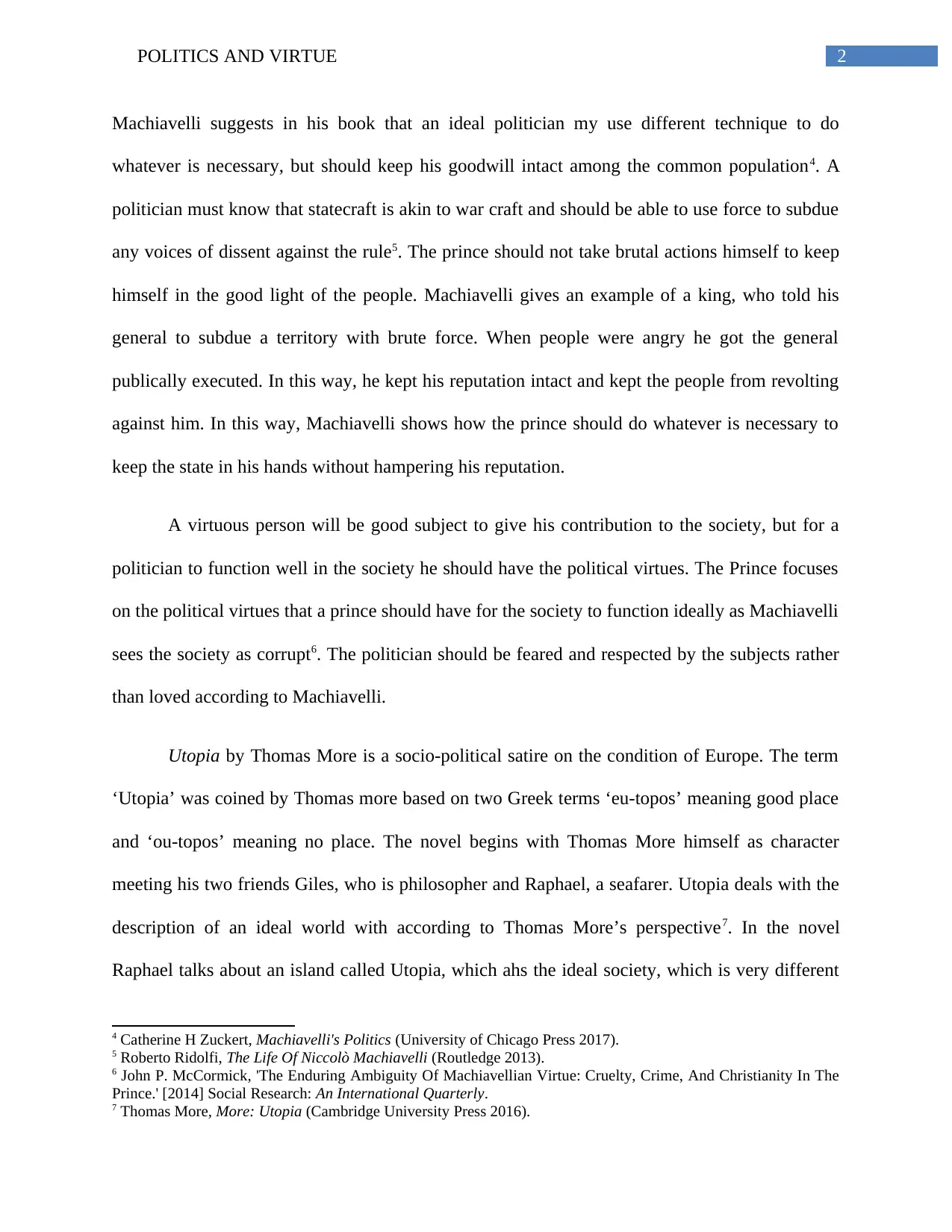
2POLITICS AND VIRTUE
Machiavelli suggests in his book that an ideal politician my use different technique to do
whatever is necessary, but should keep his goodwill intact among the common population4. A
politician must know that statecraft is akin to war craft and should be able to use force to subdue
any voices of dissent against the rule5. The prince should not take brutal actions himself to keep
himself in the good light of the people. Machiavelli gives an example of a king, who told his
general to subdue a territory with brute force. When people were angry he got the general
publically executed. In this way, he kept his reputation intact and kept the people from revolting
against him. In this way, Machiavelli shows how the prince should do whatever is necessary to
keep the state in his hands without hampering his reputation.
A virtuous person will be good subject to give his contribution to the society, but for a
politician to function well in the society he should have the political virtues. The Prince focuses
on the political virtues that a prince should have for the society to function ideally as Machiavelli
sees the society as corrupt6. The politician should be feared and respected by the subjects rather
than loved according to Machiavelli.
Utopia by Thomas More is a socio-political satire on the condition of Europe. The term
‘Utopia’ was coined by Thomas more based on two Greek terms ‘eu-topos’ meaning good place
and ‘ou-topos’ meaning no place. The novel begins with Thomas More himself as character
meeting his two friends Giles, who is philosopher and Raphael, a seafarer. Utopia deals with the
description of an ideal world with according to Thomas More’s perspective7. In the novel
Raphael talks about an island called Utopia, which ahs the ideal society, which is very different
4 Catherine H Zuckert, Machiavelli's Politics (University of Chicago Press 2017).
5 Roberto Ridolfi, The Life Of Niccolò Machiavelli (Routledge 2013).
6 John P. McCormick, 'The Enduring Ambiguity Of Machiavellian Virtue: Cruelty, Crime, And Christianity In The
Prince.' [2014] Social Research: An International Quarterly.
7 Thomas More, More: Utopia (Cambridge University Press 2016).
Machiavelli suggests in his book that an ideal politician my use different technique to do
whatever is necessary, but should keep his goodwill intact among the common population4. A
politician must know that statecraft is akin to war craft and should be able to use force to subdue
any voices of dissent against the rule5. The prince should not take brutal actions himself to keep
himself in the good light of the people. Machiavelli gives an example of a king, who told his
general to subdue a territory with brute force. When people were angry he got the general
publically executed. In this way, he kept his reputation intact and kept the people from revolting
against him. In this way, Machiavelli shows how the prince should do whatever is necessary to
keep the state in his hands without hampering his reputation.
A virtuous person will be good subject to give his contribution to the society, but for a
politician to function well in the society he should have the political virtues. The Prince focuses
on the political virtues that a prince should have for the society to function ideally as Machiavelli
sees the society as corrupt6. The politician should be feared and respected by the subjects rather
than loved according to Machiavelli.
Utopia by Thomas More is a socio-political satire on the condition of Europe. The term
‘Utopia’ was coined by Thomas more based on two Greek terms ‘eu-topos’ meaning good place
and ‘ou-topos’ meaning no place. The novel begins with Thomas More himself as character
meeting his two friends Giles, who is philosopher and Raphael, a seafarer. Utopia deals with the
description of an ideal world with according to Thomas More’s perspective7. In the novel
Raphael talks about an island called Utopia, which ahs the ideal society, which is very different
4 Catherine H Zuckert, Machiavelli's Politics (University of Chicago Press 2017).
5 Roberto Ridolfi, The Life Of Niccolò Machiavelli (Routledge 2013).
6 John P. McCormick, 'The Enduring Ambiguity Of Machiavellian Virtue: Cruelty, Crime, And Christianity In The
Prince.' [2014] Social Research: An International Quarterly.
7 Thomas More, More: Utopia (Cambridge University Press 2016).
⊘ This is a preview!⊘
Do you want full access?
Subscribe today to unlock all pages.

Trusted by 1+ million students worldwide
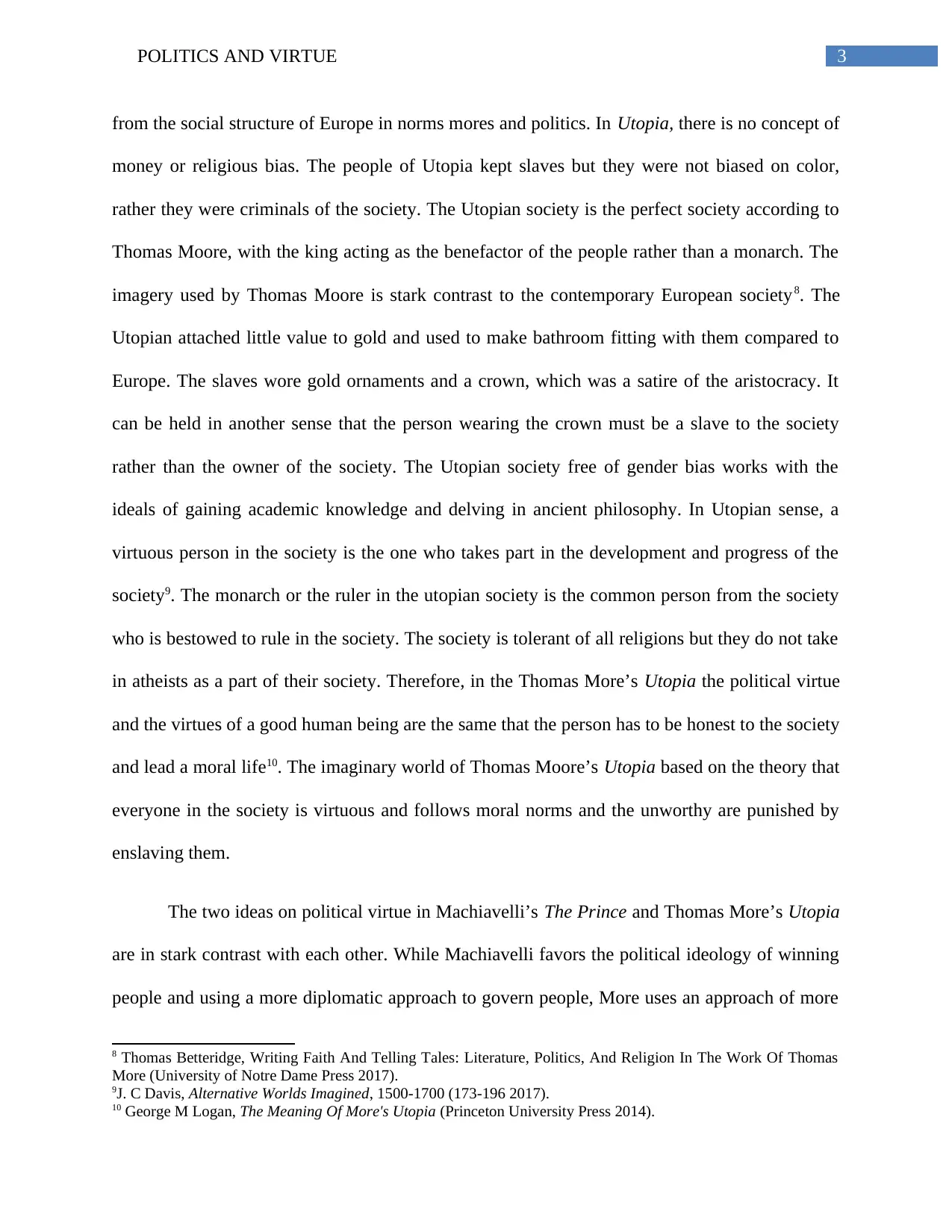
3POLITICS AND VIRTUE
from the social structure of Europe in norms mores and politics. In Utopia, there is no concept of
money or religious bias. The people of Utopia kept slaves but they were not biased on color,
rather they were criminals of the society. The Utopian society is the perfect society according to
Thomas Moore, with the king acting as the benefactor of the people rather than a monarch. The
imagery used by Thomas Moore is stark contrast to the contemporary European society8. The
Utopian attached little value to gold and used to make bathroom fitting with them compared to
Europe. The slaves wore gold ornaments and a crown, which was a satire of the aristocracy. It
can be held in another sense that the person wearing the crown must be a slave to the society
rather than the owner of the society. The Utopian society free of gender bias works with the
ideals of gaining academic knowledge and delving in ancient philosophy. In Utopian sense, a
virtuous person in the society is the one who takes part in the development and progress of the
society9. The monarch or the ruler in the utopian society is the common person from the society
who is bestowed to rule in the society. The society is tolerant of all religions but they do not take
in atheists as a part of their society. Therefore, in the Thomas More’s Utopia the political virtue
and the virtues of a good human being are the same that the person has to be honest to the society
and lead a moral life10. The imaginary world of Thomas Moore’s Utopia based on the theory that
everyone in the society is virtuous and follows moral norms and the unworthy are punished by
enslaving them.
The two ideas on political virtue in Machiavelli’s The Prince and Thomas More’s Utopia
are in stark contrast with each other. While Machiavelli favors the political ideology of winning
people and using a more diplomatic approach to govern people, More uses an approach of more
8 Thomas Betteridge, Writing Faith And Telling Tales: Literature, Politics, And Religion In The Work Of Thomas
More (University of Notre Dame Press 2017).
9J. C Davis, Alternative Worlds Imagined, 1500-1700 (173-196 2017).
10 George M Logan, The Meaning Of More's Utopia (Princeton University Press 2014).
from the social structure of Europe in norms mores and politics. In Utopia, there is no concept of
money or religious bias. The people of Utopia kept slaves but they were not biased on color,
rather they were criminals of the society. The Utopian society is the perfect society according to
Thomas Moore, with the king acting as the benefactor of the people rather than a monarch. The
imagery used by Thomas Moore is stark contrast to the contemporary European society8. The
Utopian attached little value to gold and used to make bathroom fitting with them compared to
Europe. The slaves wore gold ornaments and a crown, which was a satire of the aristocracy. It
can be held in another sense that the person wearing the crown must be a slave to the society
rather than the owner of the society. The Utopian society free of gender bias works with the
ideals of gaining academic knowledge and delving in ancient philosophy. In Utopian sense, a
virtuous person in the society is the one who takes part in the development and progress of the
society9. The monarch or the ruler in the utopian society is the common person from the society
who is bestowed to rule in the society. The society is tolerant of all religions but they do not take
in atheists as a part of their society. Therefore, in the Thomas More’s Utopia the political virtue
and the virtues of a good human being are the same that the person has to be honest to the society
and lead a moral life10. The imaginary world of Thomas Moore’s Utopia based on the theory that
everyone in the society is virtuous and follows moral norms and the unworthy are punished by
enslaving them.
The two ideas on political virtue in Machiavelli’s The Prince and Thomas More’s Utopia
are in stark contrast with each other. While Machiavelli favors the political ideology of winning
people and using a more diplomatic approach to govern people, More uses an approach of more
8 Thomas Betteridge, Writing Faith And Telling Tales: Literature, Politics, And Religion In The Work Of Thomas
More (University of Notre Dame Press 2017).
9J. C Davis, Alternative Worlds Imagined, 1500-1700 (173-196 2017).
10 George M Logan, The Meaning Of More's Utopia (Princeton University Press 2014).
Paraphrase This Document
Need a fresh take? Get an instant paraphrase of this document with our AI Paraphraser
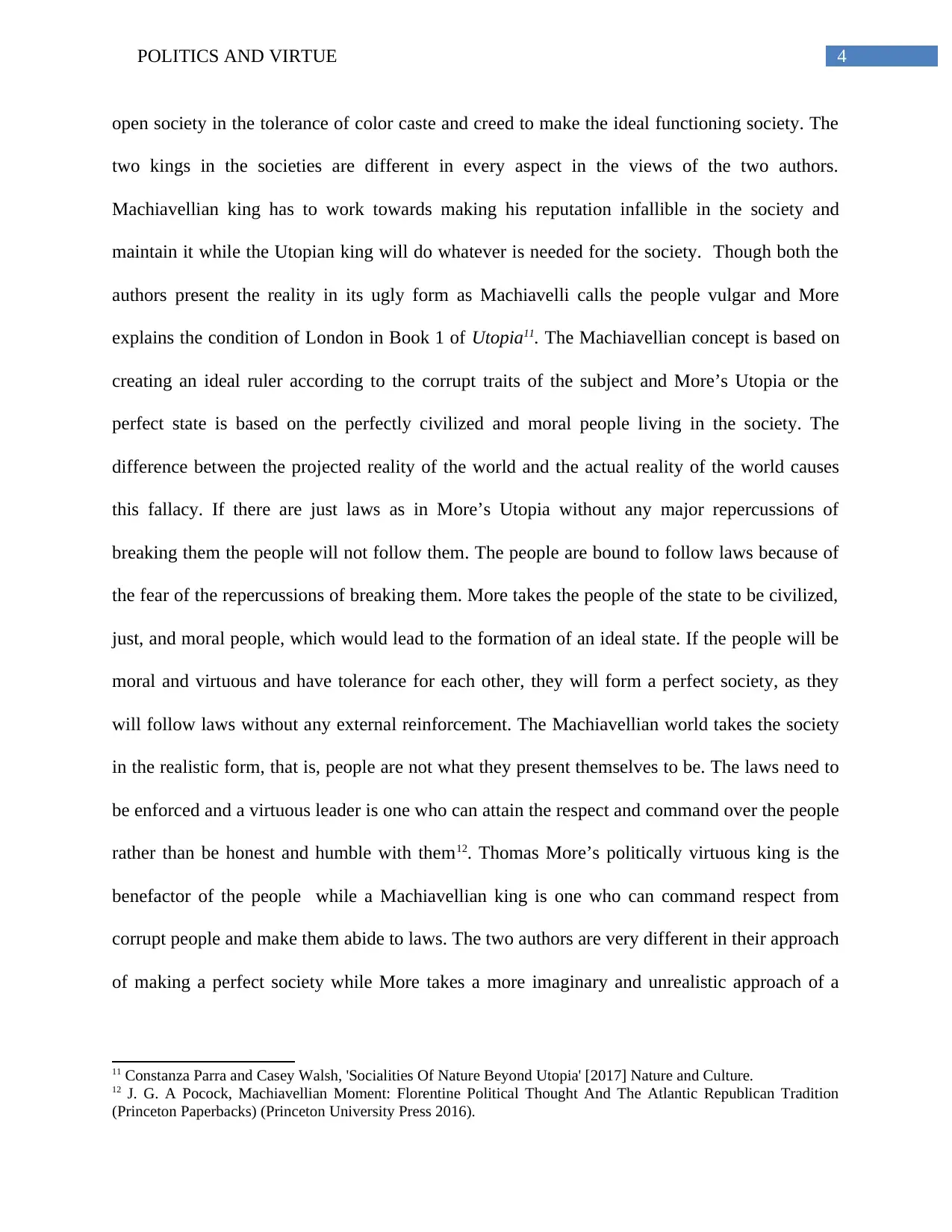
4POLITICS AND VIRTUE
open society in the tolerance of color caste and creed to make the ideal functioning society. The
two kings in the societies are different in every aspect in the views of the two authors.
Machiavellian king has to work towards making his reputation infallible in the society and
maintain it while the Utopian king will do whatever is needed for the society. Though both the
authors present the reality in its ugly form as Machiavelli calls the people vulgar and More
explains the condition of London in Book 1 of Utopia11. The Machiavellian concept is based on
creating an ideal ruler according to the corrupt traits of the subject and More’s Utopia or the
perfect state is based on the perfectly civilized and moral people living in the society. The
difference between the projected reality of the world and the actual reality of the world causes
this fallacy. If there are just laws as in More’s Utopia without any major repercussions of
breaking them the people will not follow them. The people are bound to follow laws because of
the fear of the repercussions of breaking them. More takes the people of the state to be civilized,
just, and moral people, which would lead to the formation of an ideal state. If the people will be
moral and virtuous and have tolerance for each other, they will form a perfect society, as they
will follow laws without any external reinforcement. The Machiavellian world takes the society
in the realistic form, that is, people are not what they present themselves to be. The laws need to
be enforced and a virtuous leader is one who can attain the respect and command over the people
rather than be honest and humble with them12. Thomas More’s politically virtuous king is the
benefactor of the people while a Machiavellian king is one who can command respect from
corrupt people and make them abide to laws. The two authors are very different in their approach
of making a perfect society while More takes a more imaginary and unrealistic approach of a
11 Constanza Parra and Casey Walsh, 'Socialities Of Nature Beyond Utopia' [2017] Nature and Culture.
12 J. G. A Pocock, Machiavellian Moment: Florentine Political Thought And The Atlantic Republican Tradition
(Princeton Paperbacks) (Princeton University Press 2016).
open society in the tolerance of color caste and creed to make the ideal functioning society. The
two kings in the societies are different in every aspect in the views of the two authors.
Machiavellian king has to work towards making his reputation infallible in the society and
maintain it while the Utopian king will do whatever is needed for the society. Though both the
authors present the reality in its ugly form as Machiavelli calls the people vulgar and More
explains the condition of London in Book 1 of Utopia11. The Machiavellian concept is based on
creating an ideal ruler according to the corrupt traits of the subject and More’s Utopia or the
perfect state is based on the perfectly civilized and moral people living in the society. The
difference between the projected reality of the world and the actual reality of the world causes
this fallacy. If there are just laws as in More’s Utopia without any major repercussions of
breaking them the people will not follow them. The people are bound to follow laws because of
the fear of the repercussions of breaking them. More takes the people of the state to be civilized,
just, and moral people, which would lead to the formation of an ideal state. If the people will be
moral and virtuous and have tolerance for each other, they will form a perfect society, as they
will follow laws without any external reinforcement. The Machiavellian world takes the society
in the realistic form, that is, people are not what they present themselves to be. The laws need to
be enforced and a virtuous leader is one who can attain the respect and command over the people
rather than be honest and humble with them12. Thomas More’s politically virtuous king is the
benefactor of the people while a Machiavellian king is one who can command respect from
corrupt people and make them abide to laws. The two authors are very different in their approach
of making a perfect society while More takes a more imaginary and unrealistic approach of a
11 Constanza Parra and Casey Walsh, 'Socialities Of Nature Beyond Utopia' [2017] Nature and Culture.
12 J. G. A Pocock, Machiavellian Moment: Florentine Political Thought And The Atlantic Republican Tradition
(Princeton Paperbacks) (Princeton University Press 2016).
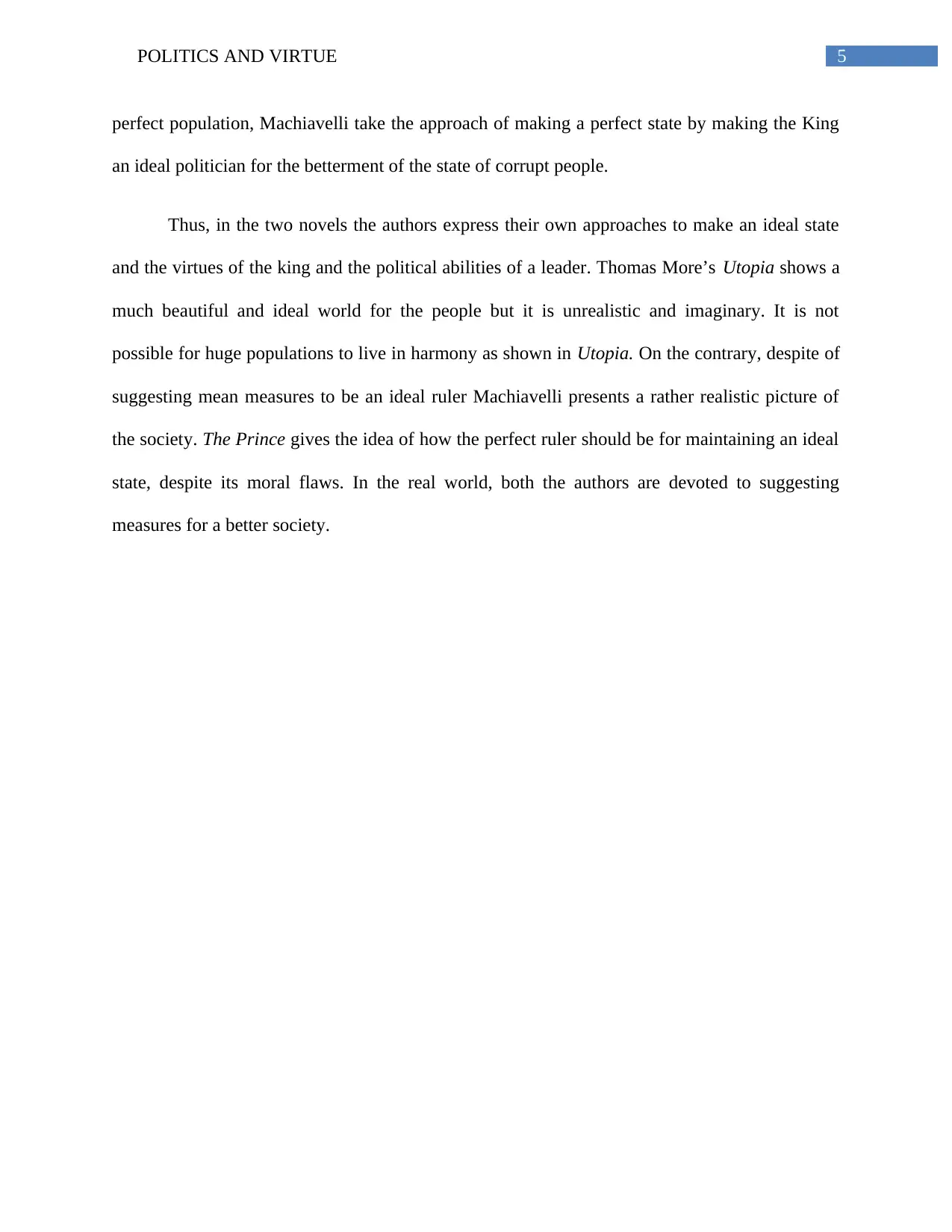
5POLITICS AND VIRTUE
perfect population, Machiavelli take the approach of making a perfect state by making the King
an ideal politician for the betterment of the state of corrupt people.
Thus, in the two novels the authors express their own approaches to make an ideal state
and the virtues of the king and the political abilities of a leader. Thomas More’s Utopia shows a
much beautiful and ideal world for the people but it is unrealistic and imaginary. It is not
possible for huge populations to live in harmony as shown in Utopia. On the contrary, despite of
suggesting mean measures to be an ideal ruler Machiavelli presents a rather realistic picture of
the society. The Prince gives the idea of how the perfect ruler should be for maintaining an ideal
state, despite its moral flaws. In the real world, both the authors are devoted to suggesting
measures for a better society.
perfect population, Machiavelli take the approach of making a perfect state by making the King
an ideal politician for the betterment of the state of corrupt people.
Thus, in the two novels the authors express their own approaches to make an ideal state
and the virtues of the king and the political abilities of a leader. Thomas More’s Utopia shows a
much beautiful and ideal world for the people but it is unrealistic and imaginary. It is not
possible for huge populations to live in harmony as shown in Utopia. On the contrary, despite of
suggesting mean measures to be an ideal ruler Machiavelli presents a rather realistic picture of
the society. The Prince gives the idea of how the perfect ruler should be for maintaining an ideal
state, despite its moral flaws. In the real world, both the authors are devoted to suggesting
measures for a better society.
⊘ This is a preview!⊘
Do you want full access?
Subscribe today to unlock all pages.

Trusted by 1+ million students worldwide
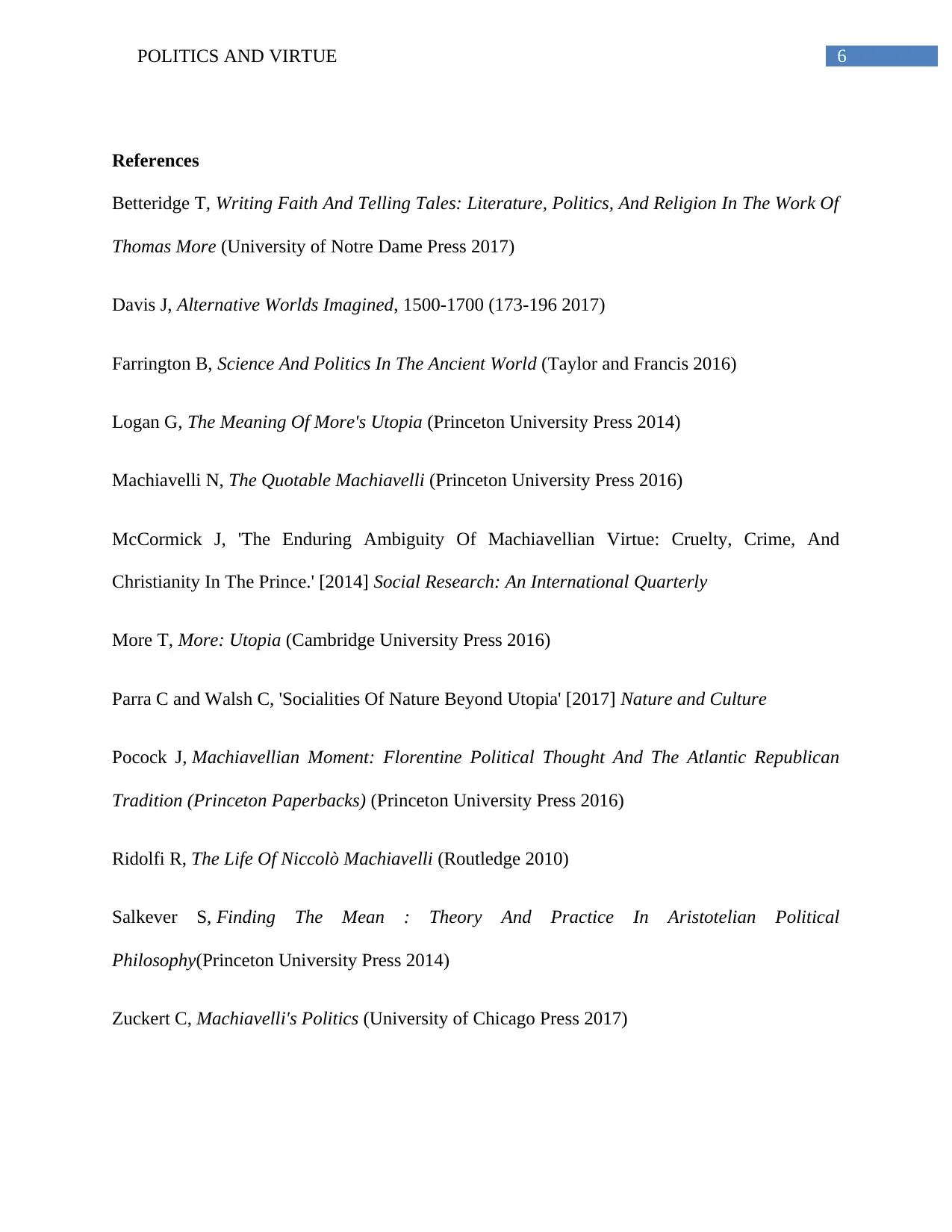
6POLITICS AND VIRTUE
References
Betteridge T, Writing Faith And Telling Tales: Literature, Politics, And Religion In The Work Of
Thomas More (University of Notre Dame Press 2017)
Davis J, Alternative Worlds Imagined, 1500-1700 (173-196 2017)
Farrington B, Science And Politics In The Ancient World (Taylor and Francis 2016)
Logan G, The Meaning Of More's Utopia (Princeton University Press 2014)
Machiavelli N, The Quotable Machiavelli (Princeton University Press 2016)
McCormick J, 'The Enduring Ambiguity Of Machiavellian Virtue: Cruelty, Crime, And
Christianity In The Prince.' [2014] Social Research: An International Quarterly
More T, More: Utopia (Cambridge University Press 2016)
Parra C and Walsh C, 'Socialities Of Nature Beyond Utopia' [2017] Nature and Culture
Pocock J, Machiavellian Moment: Florentine Political Thought And The Atlantic Republican
Tradition (Princeton Paperbacks) (Princeton University Press 2016)
Ridolfi R, The Life Of Niccolò Machiavelli (Routledge 2010)
Salkever S, Finding The Mean : Theory And Practice In Aristotelian Political
Philosophy(Princeton University Press 2014)
Zuckert C, Machiavelli's Politics (University of Chicago Press 2017)
References
Betteridge T, Writing Faith And Telling Tales: Literature, Politics, And Religion In The Work Of
Thomas More (University of Notre Dame Press 2017)
Davis J, Alternative Worlds Imagined, 1500-1700 (173-196 2017)
Farrington B, Science And Politics In The Ancient World (Taylor and Francis 2016)
Logan G, The Meaning Of More's Utopia (Princeton University Press 2014)
Machiavelli N, The Quotable Machiavelli (Princeton University Press 2016)
McCormick J, 'The Enduring Ambiguity Of Machiavellian Virtue: Cruelty, Crime, And
Christianity In The Prince.' [2014] Social Research: An International Quarterly
More T, More: Utopia (Cambridge University Press 2016)
Parra C and Walsh C, 'Socialities Of Nature Beyond Utopia' [2017] Nature and Culture
Pocock J, Machiavellian Moment: Florentine Political Thought And The Atlantic Republican
Tradition (Princeton Paperbacks) (Princeton University Press 2016)
Ridolfi R, The Life Of Niccolò Machiavelli (Routledge 2010)
Salkever S, Finding The Mean : Theory And Practice In Aristotelian Political
Philosophy(Princeton University Press 2014)
Zuckert C, Machiavelli's Politics (University of Chicago Press 2017)
1 out of 7
Your All-in-One AI-Powered Toolkit for Academic Success.
+13062052269
info@desklib.com
Available 24*7 on WhatsApp / Email
![[object Object]](/_next/static/media/star-bottom.7253800d.svg)
Unlock your academic potential
Copyright © 2020–2026 A2Z Services. All Rights Reserved. Developed and managed by ZUCOL.

